Venezuela's Internet Censorship Sparks Surge in VPN Demand
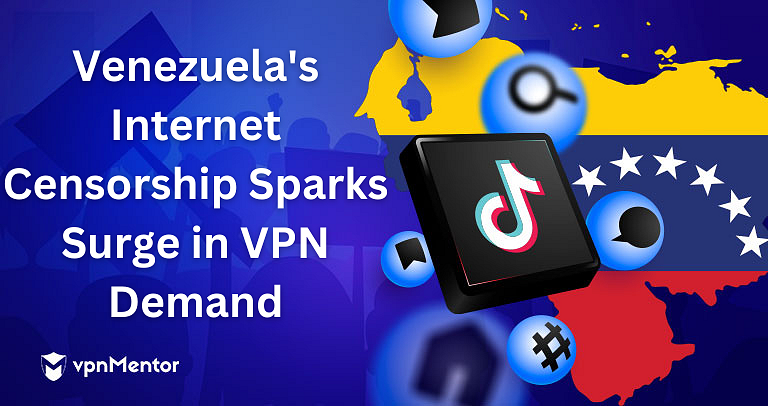
vpnMentor’s Research Team has recently witnessed a series of events in the Venezuelan digital landscape that have raised concerns about internet freedom, censorship, and political unrest.
What’s Important to Know:
- Venezuela's Supreme Court fined TikTok USD$10 million for failing to prevent viral video challenges that resulted in the deaths of three Venezuelan children.
- TikTok faced temporary blockades by Internet Service Providers (ISPs) in Venezuela for not paying the fine.
- ISPs used IP, HTTP, and DNS blocks to restrict access to TikTok and other platforms in early January 2025.
- While this latest round of blockades was taking place, protests against Nicolás Maduro’s attempt to retain the presidency of Venezuela were happening across the country. The riot police were deployed in all major cities, looking to quell any protesters.
- A significant surge in demand for VPN services has been observed in Venezuela since the beginning of 2025. Access to some VPN providers’ websites has also been restricted in the country.
In November 2024, Nicolás Maduro announced that two children had died after participating in challenges on TikTok. After a third death was announced by Education Minister Héctor Rodriguez, Venezuela's Supreme Court issued a $10 million fine against the social media platform for failing to implement measures to prevent such incidents.
The court also ordered TikTok to open an office in Venezuela to oversee content compliance with local laws, giving the platform eight days to comply and pay the fine. TikTok failed to meet the court’s deadline to pay the fine or open an office in the country. As a result, ISPs in Venezuela, including CANTV — the state’s internet provider — temporarily blocked access to TikTok.
The blockades happened on January 7 and later on January 8, lasting several hours each. According to Netblocks.org, various methods were used to restrict access to TikTok, including IP, HTTP, and DNS blocks.
 This screenshot shows Netblocks.org report, indicating zero reachability on TikTok using different Venezuelan ISPs.
This screenshot shows Netblocks.org report, indicating zero reachability on TikTok using different Venezuelan ISPs.
On January 9, under orders of CONATEL (Venezuela’s telecommunications regulator), CANTV and other private ISPs in the country implemented further blockades to restrict access to TikTok. For instance, they blocked 21 VPN providers along with 33 public DNS services as reported by VeSinFiltro.org.
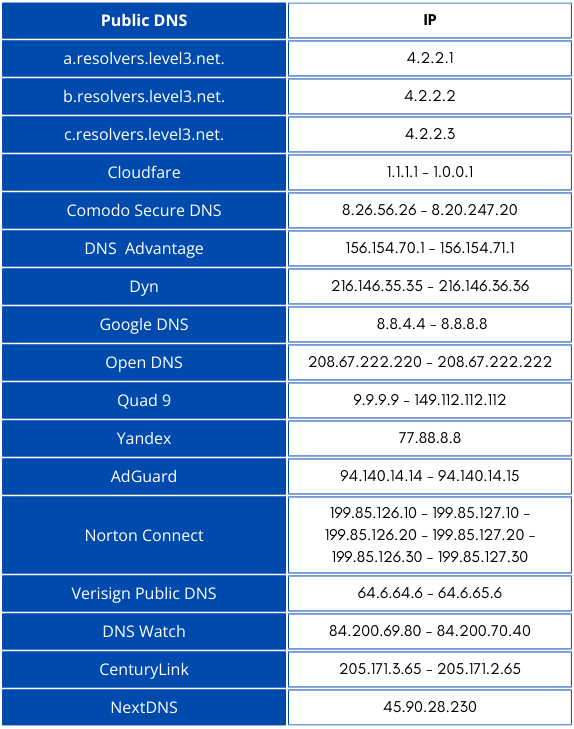 List of Public DNS reportedly blocked in Venezuela by CANTV
List of Public DNS reportedly blocked in Venezuela by CANTV
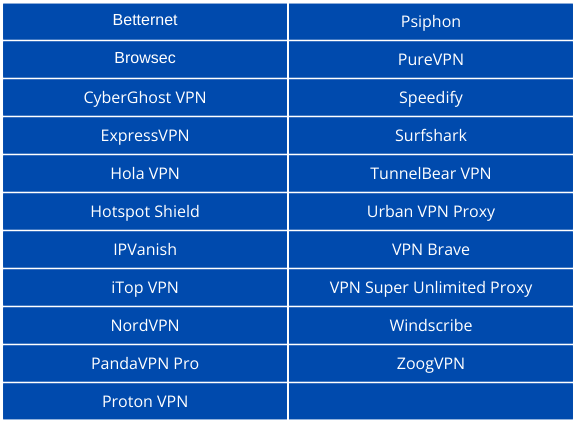 List of VPN providers reportedly blocked in Venezuela by CANTV
List of VPN providers reportedly blocked in Venezuela by CANTV
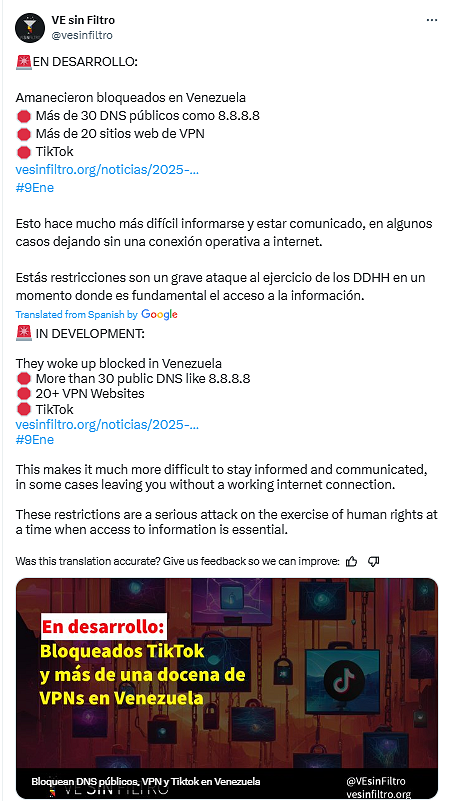 https://x.com/vesinfiltro/status/1877330408280359029
https://x.com/vesinfiltro/status/1877330408280359029
On January 10th, Netblocks also reported a blockade in Telegram in Venezuela reporting zero reachability from most of the ISP in the country.
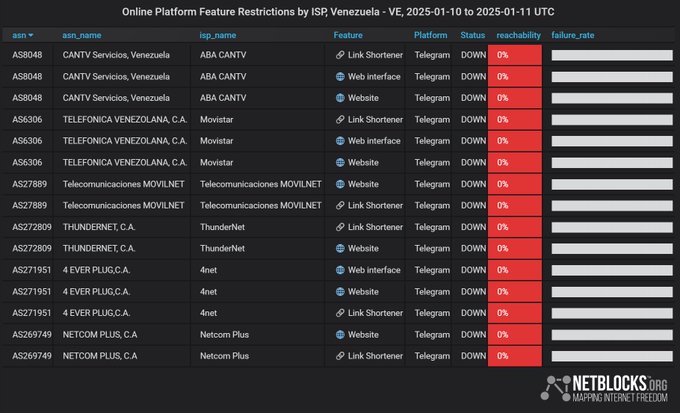 This screenshot shows Netblocks.org report, indicating zero reachability on Telegram using different Venezuelan ISPs.
This screenshot shows Netblocks.org report, indicating zero reachability on Telegram using different Venezuelan ISPs.
vpnMentor’s Research Team was able to confirm that the websites of 16 of the 23 VPN providers listed are presenting intermittency or not working in Venezuela with CANTV as ISP. The only VPN sites that are functioning properly in browsers at the time of writing are CyberGhost VPN, Hola VPN, IPVanish, NordVPN, Psiphon, and PureVPN.
Alas, the internet censorship issue in Venezuela gets worse, as TikTok is not the only platform affected by the blockades. X (formerly Twitter) has been banned intermittently since July 2024 due to accusations of orchestrating attacks against the country. While some ISPs allow access to X, state-owned providers like CANTV and Movilnet continue to block the platform.
Furthermore, some users on X reported a blockade in the PS Network, and VeSinFiltro.org also detected a block in Canva (the graphics design tool) on January 9, 2025. On the very same day, riot police were deployed in Venezuela's capital, looking to quell any protests against Nicolás Maduro’s attempt to cling to power after losing the 2024 presidential elections.
The situation in Venezuela is escalating. The actions taken against TikTok and X reflect the government's efforts to control online content and suppress dissent. The fines and subsequent blockades highlight the challenges faced by foreign tech companies operating in the country. The deployment of riot police underscores the political tensions in Venezuela, with protests against Maduro's contested election victory persisting despite crackdowns.
vpnMentor’s Research Team first observed a significant surge in the demand for VPN services in the country back in 2024, when X was first blocked. Since then, VPN usage has continued to rise in Venezuela, reaching another remarkable surge in the beginning of 2025. VPN demand grew over 200% only from January 7th to the 8th, totaling a 328% growth from January 1st to January 8th. This upward trend shows signs of further growth according to partial data from January 9th.
The increased demand for VPN services indicates a growing interest in circumventing censorship and accessing restricted content online. This trend suggests that Venezuelan citizens are actively seeking ways to bypass government-imposed restrictions on social media platforms and maintain access to a free flow of information.
As the situation continues to evolve, it is crucial for stakeholders, including tech companies, ISPs, and the government in Venezuela, to find a balance between ensuring compliance with local laws and upholding freedom of expression and access to information. It remains to be seen how these issues will be addressed moving forward and what implications they may have for the future of internet freedom in the country.
Other Recent VPN Demand Growths
Online platforms are no strangers to geoblocks in different parts of the world. In fact, there have been cases where platforms themselves impose location-based access restrictions to users. For instance, Aylo/Pornhub previously geo-blocked 17 US states in response to age-verification laws that the adult site deemed unjust.
vpnMentor’s Research Team recently published a report about a staggering 1,150% VPN demand surge in Florida following the IP-block of Pornhub in the state.
It is important to note that while VPNs can offer enhanced privacy and security benefits, they should not be used for illegal activities. vpnMentor neither encourages nor condones the misuse of VPNs for unlawful purposes. It is crucial for users to understand the legal implications of their online activities and to use VPN services responsibly.
Disclaimer: The content and images in this article are the property of vpnMentor. We permit our images and content to be shared, as long as a credit with a link to the source is provided to vpnMentor as the original author. This way, we can continue our mission to provide expert content and maintain the integrity of our intellectual property.




Please, comment on how to improve this article. Your feedback matters!